The most common pathology of the genitourinary system in men is inflammatory disease of the prostate gland. According to statistics, prostatitis is diagnosed in every 10 adult patients. Without adequate treatment, the disease progresses rapidly, leading to serious complications and affecting a man's sexual life.
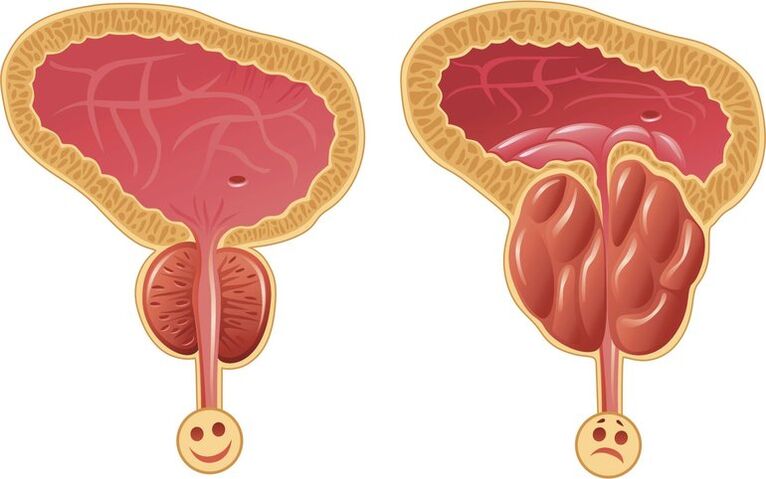
Symptoms of the disease
It is easier to treat when any disease is detected at an early stage. Prostatitis occurs in both acute and complex forms - chronic, occurs during indifferent inflammation of the prostate. The symptoms and treatment of the disease are different and depend on its stage and type. In the acute course of the pathology, a man lives:
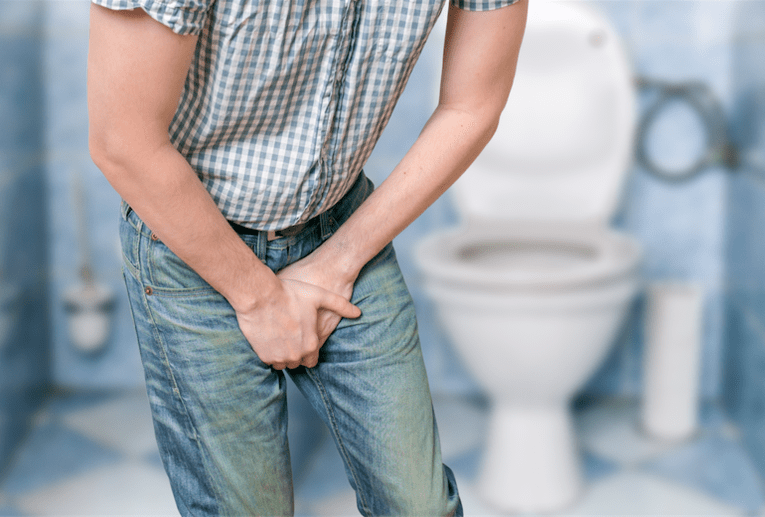
- Difficulty urinating. One of the first symptoms is problems with urination due to narrowing of the urinary tract. In the early stages, the prostate begins to grow in size and squeezes the ducts a bit.
- Pain in the lower abdomen, which is most disturbed after physical exertion or at the end of the day. Pain is different in feel and intensity: there may be pulling, cutting, pain. They then spread through the testicles and penis and are passed into the rectum during defecation. The disease only causes constipation, which increases the inflammatory process in the prostate gland.
- Do not urinate often. A man who has not woken up earlier to empty his bladder can go to the toilet 1-2 times a night at the onset of the disease. With another form of prostatitis, the urge to urinate decreases. This gives the impression of excessive density of the bladder and incomplete emptying after going to the toilet.
- Visual changes in urine. Already in the urine in the early stages of the pathology can be found pus or blood impurities.
- Occurrence of sexual dysfunctions. Men experience erection problems and severe pain during ejaculation.
- Prolonged increase in body temperature in the region of 39 degrees, which is accompanied by chills, weakness and body aches.
Most of the symptoms of the disease are obvious. The task of men is to carefully monitor the condition of their bodies and its changes, not to miss the first symptoms and not to allow the pathology to progress to a chronic stage.
The first manifestations of inflammation of the prostate gland in members of the stronger sex in a neglected form are almost the same as in the acute stage of the disease. However, they are accompanied by symptoms such as:
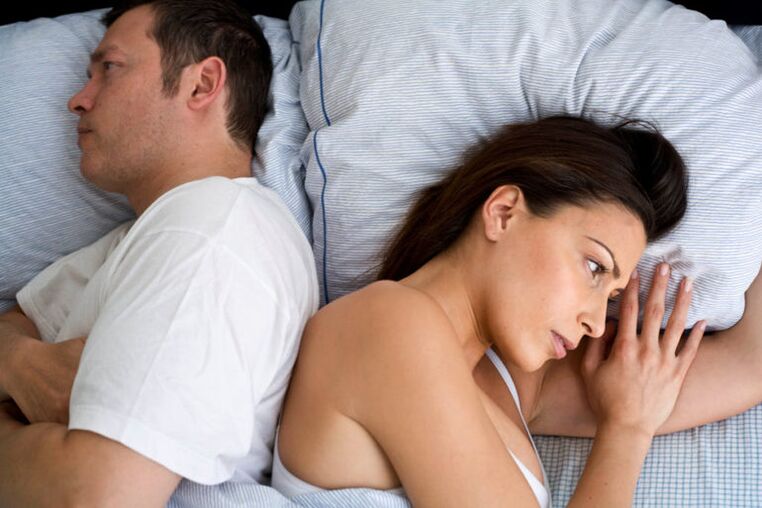
- Decreased libido, loss of erection during sex, detection of blood in sperm.
- Frequent urination, fullness in the bladder, white flakes in the urine. During an exacerbation, a man may be completely deprived of the ability to empty his bladder because an inflamed prostate obstructs the passage of urine in the urethra.
- Depression, insomnia or drowsiness. Men suffering from a disease such as prostatitis often experience attacks of anger or aggression associated with psycho-emotional disorders.
It makes sense to be examined by several doctors and different institutions to avoid mistakes in making a correct diagnosis. The symptoms and treatment of prostatitis, like any other disease of the genitourinary system, is not a matter to be postponed or saved for health.
Reasons for development
It is almost impossible to determine the root cause of the pathology. At the same time, there are many provocative factors, each of which is very serious, especially given the habit of indifference to men's health. The main reasons:

- Occurrence of obstruction in the pelvic region. They are characterized by slow blood circulation, during which tissue nutrition deteriorates, edema occurs and capillary function is impaired.
- Hypothermia. Even once frozen, men themselves develop inflammation of the prostate gland.
- A sedentary lifestyle in which members of the stronger sex sit in one position for hours. A less harmful factor is work related to vibration (tractor operators, drivers). Constant concussion damages the perineum and weakens the organs in the pelvic region, which creates additional conditions for the onset of inflammation.
- Transmitted venereal diseases. Sexually transmitted infections cannot bypass the prostate. Even after treatment, immunity decreases, the prostate gland becomes sensitive.
- Seizure of feces. Constipation causes increased stress during rectal emptying, damaging the prostate. In addition, stagnation intensifies and reverse absorption of toxins occurs in the nearby prostate gland.
- To go to extremes in intimate life. Lack and excess of sexual intercourse has an equally negative impact on reproductive health. Excessive activity causes the prostate to wear out, and abstinence increases its stagnation.
- Interruption of sexual intercourse. It is known as a method of contraception, ineffective and harmful to men's health. Attempts to control an already functioning physiological process are very harmful.
- Alcohol abuse, nutrition. These two factors cause swelling of the prostate and the formation of malignant neoplasms.
- Urological diseases. Due to the close anatomical connection with the reproductive system, inflammatory processes in the urinary system can penetrate a little lower and affect the prostate.
By identifying the causes of inflammation, the urologist selects treatment individually, excluding adverse factors.
Methods of treatment
Treatment of prostatitis should be comprehensive. After the diagnosis of the disease, the doctor, as a rule, prescribes an individual treatment regimen. The patient needs at least 4-6 months to achieve a positive effect. Today, many different therapies are used, including medication, physiotherapy, and massage. In official medicine, these methods are considered the most effective and safe for the health of the stronger sex.

Quality psychotherapy is an equally important measure, because the constant painful feelings and problems in intimate life have a negative impact not only on the overall well-being of the patient, but also on his psychological condition.
Medical therapy
If medical measures do not work or the prostate gland prevents the flow of urine, surgery is indicated. Surgery can cause infertility, so it is not prescribed to young men.
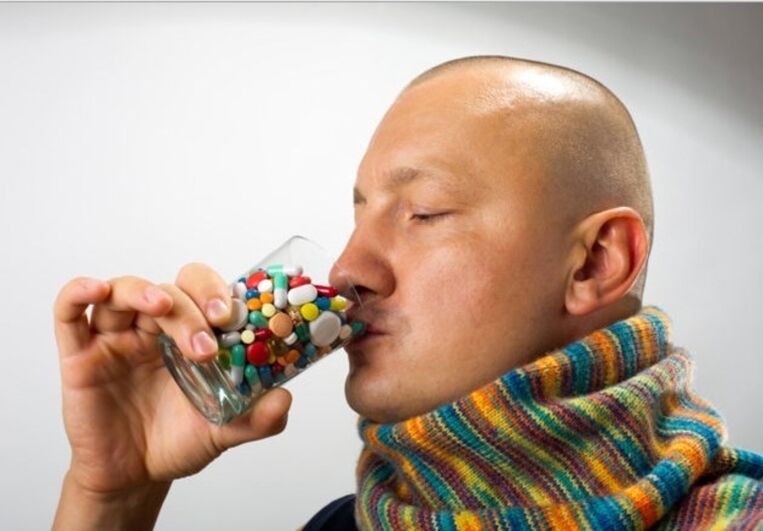
Antibacterial therapy is carried out with infectious prostatitis. If the cause of the pathology is not bacteria or viruses, antibiotic treatment is considered meaningless. Alpha-blockers are used to relax the muscles of the prostate, improve urine flow and relieve pain in the perineal area.
Muscle relaxants will help reduce pain and relieve muscle tension in the pelvic region. Severe patients are prescribed diuretics drops that prevent urination and further intoxication of the body.
The course of treatment should be completed, even if the symptoms of the disease disappear completely. Symptoms of prostatitis often disappear at the beginning of antibiotic therapy, but become chronic when treatment is stopped.
Non-bacterial prostatitis requires a different treatment regimen. It consists of taking analgesics and antipyretics.
At the same time as the main treatment, the urologist prescribes supportive therapy, which includes bed rest, drinking plenty of water and taking a sedentary bath. Patients should follow a diet that limits alcohol, caffeine, fatty and spicy foods.
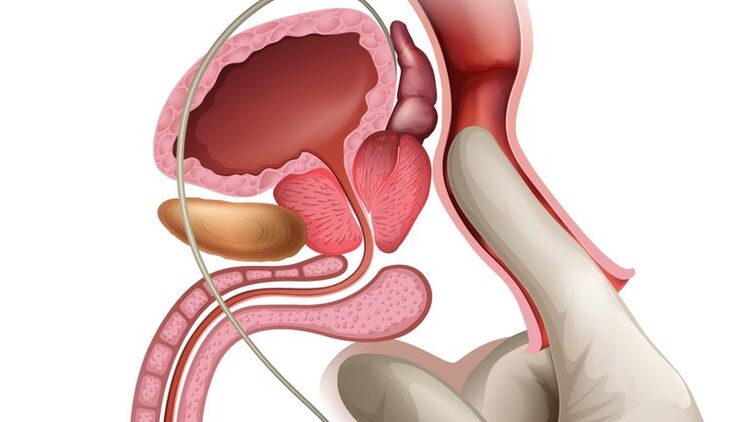
The most effective remedy for chronic inflammation of the prostate gland is regular prostate massage, which reduces the likelihood of re-inflammation. The course of treatment consists of 10 sessions. Contraindications to the procedure are exacerbation of rectal cancer and prostatitis.
Physiotherapy is used not only as a treatment, but also for prophylaxis. Improves blood circulation, increases muscle tone, accelerates tissue regeneration and increases cell permeability. This method is contraindicated for high blood pressure, fever, epilepsy, cancer, urolithiasis, anemia, diseases of the kidneys and cardiovascular system.
The use of rectal suppositories reduces the negative effects on the functioning of internal organs. Suppositories may contain antibiotics, herbs, antispasmodics. They eliminate swelling, eliminate inflammation and restore urine output.
Folk ways
Pathological therapy at home using alternative medicine prescriptions is effective only at an early stage. There are many ways to relieve the main symptoms of inflammation:
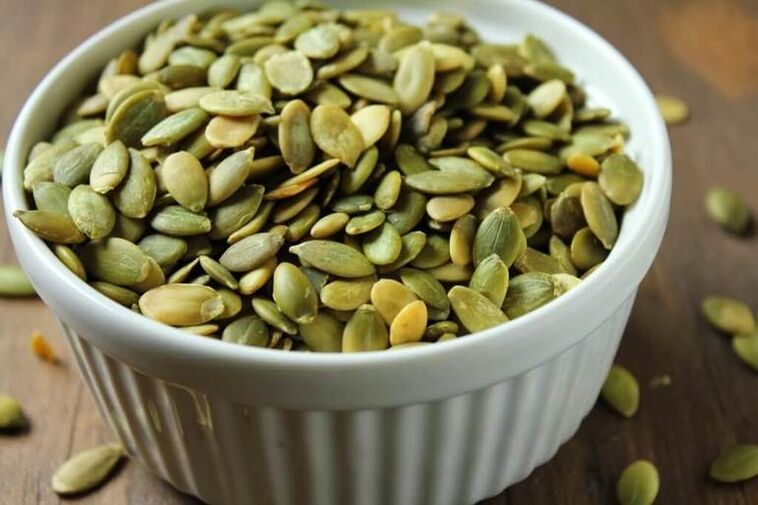
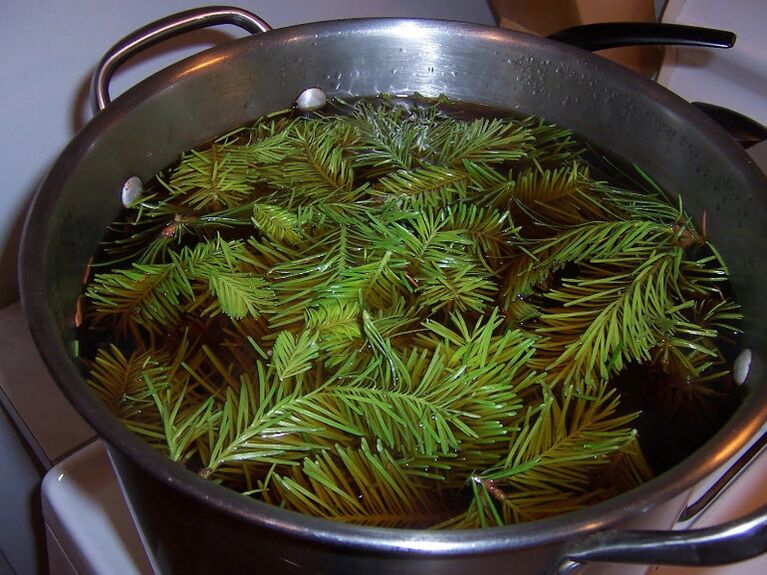
- Roasted pumpkin seeds (500 g) are wrapped in a meat grinder, then honey (200 g) is added and mixed well. Pumpkin-honey mixture is used to make balls not larger than walnuts. Dissolve 1 piece 2-3 minutes half an hour before each meal. The product is stored in the refrigerator. Pumpkin seeds contain large amounts of zinc, which is necessary for the normal functioning of the genitourinary system.
- Crushed and dried aspen bark (100 g) is placed in a half-liter jar and poured with vodka (200 g). The container is tightly closed and left to infuse in a dark place. After two weeks, the tincture is filtered and consumed 20 drops diluted in a quarter glass of water 3 times a day before meals.
- Honey (1 tsp), eggs (1 tsp) are mixed with rye flour (3 tablespoons), thin candles are made from dough not exceeding 1 cm in diameter. Candles are stored in the refrigerator. They are inserted into the anus in the morning and evening after emptying the rectum. The course of treatment is about 4 weeks, then they take a break and repeat the therapy.
- Small onions (3 pieces) rubbed into a thin frying pan, pour boiling water (3 tablespoons) and insist one day. The decoction is taken in 50 ml per hour.
- Pine stalks (200 g) are boiled with boiled water (2 l) on low heat for 2-3 hours. After boiling, the decoction turns into an extract. Prepare such a concentrate immediately before taking a hot bath. The water level should not be higher than the middle of the chest. The pelvis is rubbed with the drug for 15 minutes until redness appears. Therapy is performed daily for 2 weeks. Baths have antimicrobial effects, anesthetize and improve urination.
No matter how good the effect of folk remedies, it is difficult to compete with the achievements of pharmacology. The most correct and effective solution would be an integrated approach to the treatment of prostatitis.






























